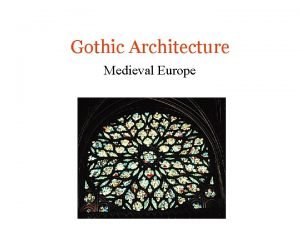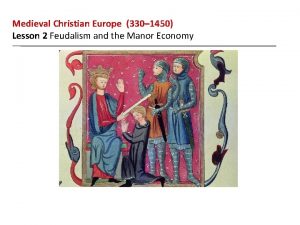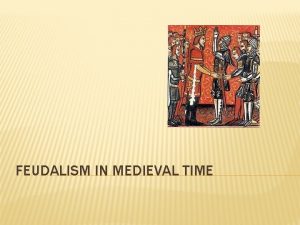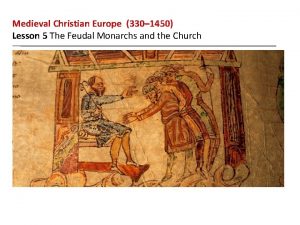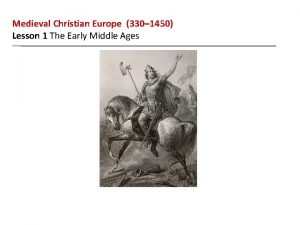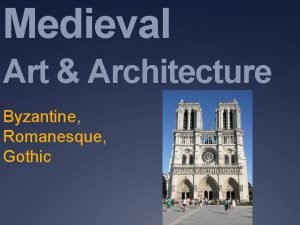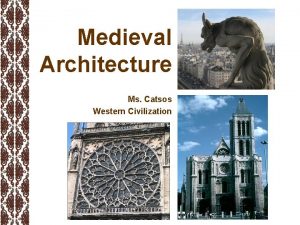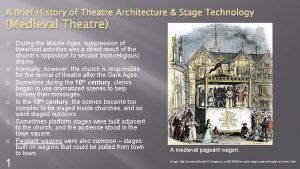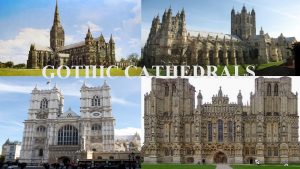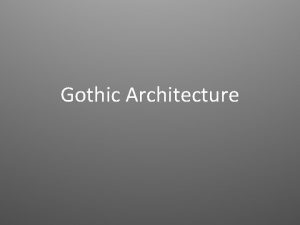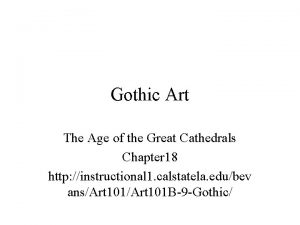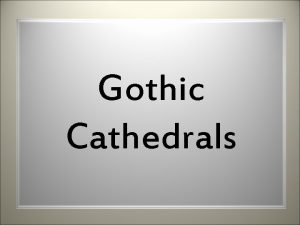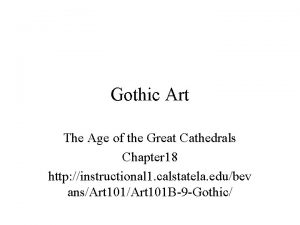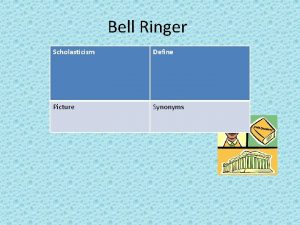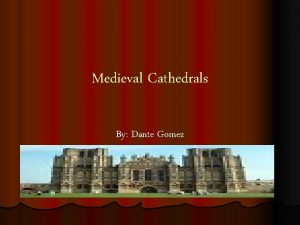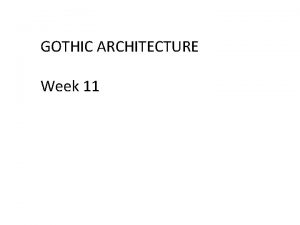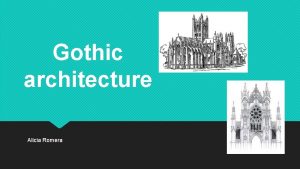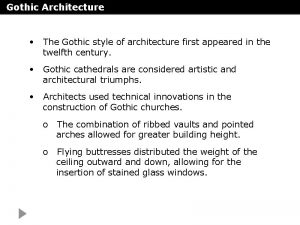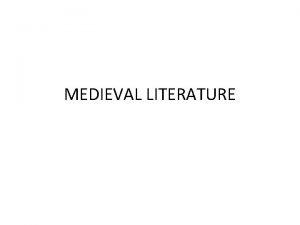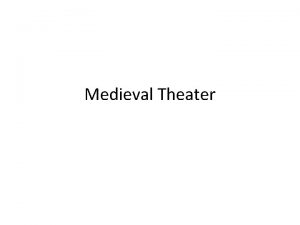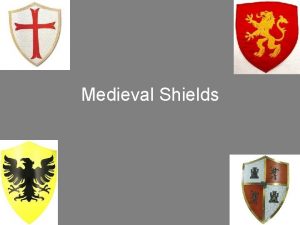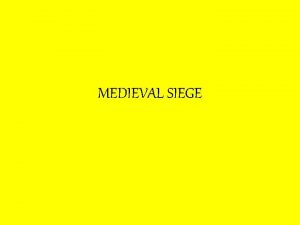Gothic Architecture Medieval Europe Gothic Cathedrals The Gothic



































- Slides: 35

Gothic Architecture Medieval Europe

Gothic Cathedrals • The Gothic period lasted from the late 1100's to the 1500's. Most Romanesque cathedrals had been built to replace Early Christian or Carolingian predecessors. Many Gothic cathedrals resulted from additions to a Romanesque church. The desire to enrich an earlier church was a strong motivation behind Gothic cathedral building. Many Romanesque churches were demolished to make way for a cathedral in the new style. As a result, the majority of cathedrals in Europe are Gothic. The main difference between Romanesque and Gothic styles is the way in which space is conceived. Space in Romanesque buildings is achieved by adding bays, unit by unit, to create a total space. A Gothic building is conceived as a total space divided into units. • Gothic architecture originated in northern France in the choir of 1140 -1144 at the abbey of St. Denis, near Paris. The style spread to the cathedrals of northeastern France, at Laon and Noyon, and beyond. It was used in the choir of Canterbury Cathedral (1174 -1184), England, and in the Swiss cathedrals of Lausanne and Geneva before 1200. • In about 1175, French cathedral builders developed the flying buttress, a brick or stone arched support built against the outside walls. Because it allowed the major supports for the vault to be taken outside the building, architects were able to construct thin-walled churches with fully vaulted roofs. For the first time, builders were able to substitute beautifully coloured stained glass windows for large areas of wall. Notre Dame Cathedral in Paris (1163 -1250) was one of the first buildings to have flying buttresses. The exciting combination of Gothic features--pointed arches, ribbed vaults, stained glass, lateral spaciousness, and an interior patterned with a grid of fine lines--was adopted throughout Europe. • The use of the flying buttress also allowed architects to build very high. A succession of tall, fully glazed cathedrals was built between 1190 and 1260, including Bourges (37 metres), Chartres (35 metres), Reims (36. 5 metres), Amiens (42. 4 metres), Beauvais (48 metres), and Cologne (43. 5 metres). The collapse of the vaults at Beauvais in 1284 ended this line of architectural exploration. Thereafter, masons of the High Gothic period enriched their architecture by other means. In France, this often took the form of increasingly elaborate window and wall tracery, and ornamental stone or wooden pattern work. Fine examples of tracery are the rose windows at the cathedral of Clermont-Ferrand (about 1280), and the south transept front at Senlis Cathedral.

Gothic Cathedrals (Cont’d) • In England, most early Gothic cathedrals made extensive use of Purbeck marble, as at Rochester (choir begun about 1200) and Salisbury (begun 1220). Unlike their French counterparts, English architects stressed surface ornament in preference to stained glass. This is best seen at Lincoln Cathedral, built between 1192 and about 1270. Here, the vaults are richly patterned and the carving is elaborate, but the windows are small and simple. English late Gothic architecture, such as the east face of Wells (1323 -1338) and the nave of Canterbury (1379 -1405), favours complex mouldings around the arches, ornamental niches and canopies, and the extension of tracery across walls and windows. • In Spain, Gothic cathedral building was initially heavily influenced by developments in France. So, although the cathedrals of Avila (begun about 1160), Burgos (begun 1224), and Toledo (begun 1227) have an exuberant Spanish layer of ornament to their upper walls, the great influence of the earlier French experiments is obvious. Indeed, Leon Cathedral (begun about 1254) appears to be a northern French building on Spanish soil. Later Gothic cathedrals in Spain are very different. The work of architects Jaime Fabre (east end of Barcelona Cathedral, 1298 -1329), Juan Gil de Hontanon (Salamanca Cathedral, 1512 -1538, and Segovia Cathedral, 1522 -1558), and Alonso Martinez (Seville Cathedral, 1402 -1568), ranks amongst the most distinctive in Europe. • In Germany, early Gothic architecture, such as in the choir of Magdeburg Cathedral (begun 1209), also reflects French influence. Cologne Cathedral (begun 1248) is a Parisian design which combines the ground plan of Amiens Cathedral with the fragile tracery and gables of St. Denis and the Sainte Chapelle, Paris. German late Gothic architecture is, by contrast, astonishingly inventive. It favours tall aisles, fancy vaulting patterns, and a very fluid approach to the handling of space. The style was exported throughout central Europe and is seen in cathedrals such as Prague (13441399) and Vienna (about 1304 -1500).

Notre Dame de Paris

Notre Dame de Paris Floor Plan

Notre Dame de Paris Windows and Arches

Laon Cathedral 1160 - 1225

Notre Dame de Paris Windows and Arches

Salisbury Cathedral

Bourges Cathedral

Bourges Cathedral

Bourges Cathedral Interior

Bourges Stained Glass

Bourges Stained Glass

Bourges - Exterior

Amiens Cathedral

Amiens Cathedral

The Flying Buttress

Chartres Cathedral

Chartres Floor Plan

Chartre Flying Buttresses

Chartre Exterior

Chartre Cathedral • Exterior

Chartre Cathedral Exterior Sculpture

Chartre Cathedral Exterior Sculpture

Chartre Exterior Sculpture

Chartre Exterior Sculpture

Chartre Interior

Chartre Interior

Cologne Cathedral

Cologne Cathedral

Winchester Cathedral

Exeter Cathedral

Wells Cathedral

Utrecht Cathedral
 Gothic cathedrals in europe
Gothic cathedrals in europe Medieval christian europe part 2
Medieval christian europe part 2 Medieval hierarchy
Medieval hierarchy “how did the vikings change medieval europe?”
“how did the vikings change medieval europe?” Topic 1 medieval christian europe
Topic 1 medieval christian europe Unit 8 lesson 5 medieval christian europe
Unit 8 lesson 5 medieval christian europe Medieval kingdoms in europe lesson 1
Medieval kingdoms in europe lesson 1 Byzantine, romanesque and gothic art characteristics
Byzantine, romanesque and gothic art characteristics Medieval architecture
Medieval architecture Medieval architecture
Medieval architecture Evolution of theatre architecture
Evolution of theatre architecture American gothic movement
American gothic movement Hình ảnh bộ gõ cơ thể búng tay
Hình ảnh bộ gõ cơ thể búng tay Frameset trong html5
Frameset trong html5 Bổ thể
Bổ thể Tỉ lệ cơ thể trẻ em
Tỉ lệ cơ thể trẻ em Chó sói
Chó sói Thang điểm glasgow
Thang điểm glasgow Hát lên người ơi
Hát lên người ơi Kể tên các môn thể thao
Kể tên các môn thể thao Thế nào là hệ số cao nhất
Thế nào là hệ số cao nhất Các châu lục và đại dương trên thế giới
Các châu lục và đại dương trên thế giới Công thức tiính động năng
Công thức tiính động năng Trời xanh đây là của chúng ta thể thơ
Trời xanh đây là của chúng ta thể thơ Cách giải mật thư tọa độ
Cách giải mật thư tọa độ Phép trừ bù
Phép trừ bù độ dài liên kết
độ dài liên kết Các châu lục và đại dương trên thế giới
Các châu lục và đại dương trên thế giới Thể thơ truyền thống
Thể thơ truyền thống Quá trình desamine hóa có thể tạo ra
Quá trình desamine hóa có thể tạo ra Một số thể thơ truyền thống
Một số thể thơ truyền thống Cái miệng nó xinh thế chỉ nói điều hay thôi
Cái miệng nó xinh thế chỉ nói điều hay thôi Vẽ hình chiếu vuông góc của vật thể sau
Vẽ hình chiếu vuông góc của vật thể sau Nguyên nhân của sự mỏi cơ sinh 8
Nguyên nhân của sự mỏi cơ sinh 8 đặc điểm cơ thể của người tối cổ
đặc điểm cơ thể của người tối cổ Ví dụ về giọng cùng tên
Ví dụ về giọng cùng tên
